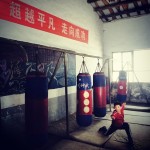The other day I met Liu Sui Bin at a teahouse in west Chengdu, The Green Well, opposite the Shiren Park main gate. The district around Shiren Park looks like the rest of Chengdu looked 10 years ago: fly in the wall eateries sandwiched between crimson lit barber shops and lotto dispensaries; families wandering around chewing on sunflower seeds; men in dirty clothes and badly combed hair sitting on motorbikes eyeing the girls and smoking Baisha brand smokes.
It’s not the district I would imagine to find Liu Sui Bin in. And the Green Well is just a mahjong parlor above an old style KTV/brothel joint, not the venue I would expect to be discussing Taoist philosophy in either.
Liu Sui Bin arrives a bit late from the airport. He was in Lijiang for Golden Week and tomorrow he flies to Hong Kong to participate in the local Tai Qi Association’s festivities for the National Holiday. Before he goes home to his wife, Liu Sui Bin sets aside two hours of his time to talk shop with me. As always, he is dressed in white flowing robes and kungfu slippers. He sets two iPhones down on the table, orders an Eight Treasures Tea and fixes me with his sleepy-eyed gaze.
“Did you know that there were once more than 160 prominent kungfu schools in China,” he asks me. “Around Liberation they revised the number down to about 130. At least 80 of them have disappeared since.”
And over the next two hours Liu Sui Bin tells me why all of these schools have failed to survive into the 21st century, a story which also serves to explain how a small-time martial arts trainer from the Sichuan countryside created one of the fastest growing martial arts brands in China today, Qingcheng Taiji.
Liu Sui Bin is not just the face of Qingcheng Taiji. He is the mastermind behind a marketing and promotion campaign that has the local Dujiangyan and Chengdu governments doling out praise, endorsements, and land, while large companies hire the taiji master out to train their staff. Liu Sui Bin is constantly on the road promoting the essence of Qingcheng Taiji, which for him has already surpassed the physical movements one normally associated with taiji.
“People want to be happy,” he says with a shake of his locks. “They are looking for a way to find peace and balance in their lives and that is what I am promoting. Not just some movements, or a Taoist religion, but 道家 … a Taoist philosophy.”
Midway through the conversation, he receives a text message from a millionaire female executive, who is also the head of an association of woman CEOs. He reads through it with a little smile and then leans forward to show me the conversation:
“道师好,…” begins the message, which I will translate as “Wishing the Sage well, …”
Thank you for your advice and counsel … now more than ever, we need balance and an emotional attitude that can carry us through the day … even when things are so stressful and there doesn’t seem to be any space to breathe anywhere …
“You see,” says the sage in that quiet, irony-laced voice of his. “It’s not about how powerful my kung fu is, or powerful my master was. It’s about reaching the modern person and giving them a way to feel peace in their lives.”
As the night goes on, men at the other tables take their shirts off and younger couples start showing up, fresh from a bar or a club. They stare at me more than they stare at the wispy bearded man in white silk robes. When the serving girl comes to re-fill the hot water canister, I see scars on her index finger from chopping vegetables. She giggles wide-eyed at me as Liu Sui Bin dashes off another Weibo post.
I came to Liu Sui Bin because he has an encyclopedic knowledge of kung fu in China. Who are the successful masters? Who have failed? Who was once whose master and what are they all doing now? He has his finger on the pulse of martial arts in China, like a grandmaster controlling an opponent with light touch on the right spot. I want his help with my project. And I want to make him a subject of this project. When we get to this part in the conversation, Liu Sui Bin goes unapologetically into businessman mode:
“What is this book you are working on? Who is it about? Who is paying for it? Who will publish it?”
I tell him the basic premise, a book about kungfu disappearing from the Mainland, and he nods his head approvingly. “You could focus on Sichuan alone and be able to tell that story, ” he says. But before he tells me about the dozens of schools that died out, or the reasons why, before he shows me the text message from the female CEO, he asks the question that answers it all:
“When you do this book, and it gets published abroad” he says, leaning back and fixing those sleepy eyes on me, “what is in it for the masters?”



Someone thinks this story is hao-tastic…
This story was submitted to Hao Hao Report – a collection of China’s best stories and blog posts. If you like this story, be sure to go vote for it….